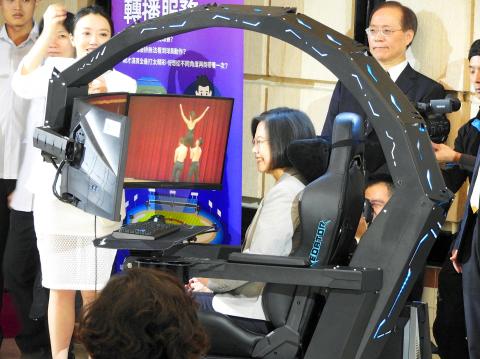Chunghwa Telecom Co (中華電信) yesterday conducted a 5G spectrum-based field trial for autonomous vehicles at a lab in New Taipei City’s Banciao District (板橋) to demonstrate vehicle-to-infrastructure technology developed by a subsidiary.
The company expects to provide more autonomous vehicle tests and trials using 5G networks at its lab in the future.
“Our aim is to help grow this 5G value chain ranging from chips and small cell stations to all kinds of applications,” Chunghwa Telecom chairman Sheih Chi-mau (謝繼茂) told reporters on the sidelines of the field trial.

Photo: Lai Hsiao-tung, Taipei Times
The company focuses on the delivery of real-time information, such as traffic data to vehicles using high-speed and low-latency 5G technology, while Kingwaytek Technology Co (勤崴), a 26 percent held subsidiary, is helping to develop autonomous driving systems, particularly for shuttle buses, Sheih said.
Kingwaytek is a supplier of high-definition (HD) electronic maps and vehicle navigation systems.
“We are developing a decisionmaking system for self-driving vehicles and a traffic prediction system, which will be combined with our HD electronic maps to complete our self-driving solution,” Kingwaytek chairman Alfred Ko (柯應鴻) said.
Kingwaytek plans to conduct a series of self-driving field trials next year in collaboration with Automotive Research and Testing Center (車輛研究測試中心) via a sandbox program in Changhua County, Ko said.
The trial, if successful, would pave the way for the company to sell its self-driving solutions overseas in the next two to three years, injecting new revenue growth momentum into the business, he said.
Southeast Asian nations would be ideal markets, as Chunghwa Telecom’s strength in the region could provide leverage, he said.
Kingwaytek operates one autonomous vehicle trial field in Changhua County and another in Taoyuan’s Hutoushan (虎頭山).
Yesterday, Chunghwa Telecom and Taiwan Mobile Co (台灣大哥大) both said separately that they have submitted their applications to bid for 5G bandwidth and are prepared to substantially invest in 5G network deployment.
Asked if Taiwan Mobile still aims to secure 100 megahertz of bandwidth at the auction, Taiwan Mobile president Jamie Lin (林之晨) said: “Only for a reasonable price.”
“Taiwan Mobile will make 5G [services] available in the second half of next year,” Lin said.
The telecom is in talks with multiple agencies about launching 5G trial fields, he said, adding that the company has one trial field in the baseball stadium in New Taipei City’s Sinjhuang District (新莊).

Sweeping policy changes under US Secretary of Health and Human Services Robert F. Kennedy Jr are having a chilling effect on vaccine makers as anti-vaccine rhetoric has turned into concrete changes in inoculation schedules and recommendations, investors and executives said. The administration of US President Donald Trump has in the past year upended vaccine recommendations, with the country last month ending its longstanding guidance that all children receive inoculations against flu, hepatitis A and other diseases. The unprecedented changes have led to diminished vaccine usage, hurt the investment case for some biotechs, and created a drag that would likely dent revenues and

Global semiconductor stocks advanced yesterday, as comments by Nvidia Corp chief executive officer Jensen Huang (黃仁勳) at Davos, Switzerland, helped reinforce investor enthusiasm for artificial intelligence (AI). Samsung Electronics Co gained as much as 5 percent to an all-time high, helping drive South Korea’s benchmark KOSPI above 5,000 for the first time. That came after the Philadelphia Semiconductor Index rose more than 3 percent to a fresh record on Wednesday, with a boost from Nvidia. The gains came amid broad risk-on trade after US President Donald Trump withdrew his threat of tariffs on some European nations over backing for Greenland. Huang further

Nvidia Corp’s GB300 platform is expected to account for 70 to 80 percent of global artificial intelligence (AI) server rack shipments this year, while adoption of its next-generation Vera Rubin 200 platform is to gradually gain momentum after the third quarter of the year, TrendForce Corp (集邦科技) said. Servers based on Nvidia’s GB300 chips entered mass production last quarter and they are expected to become the mainstay models for Taiwanese server manufacturers this year, Trendforce analyst Frank Kung (龔明德) said in an interview. This year is expected to be a breakout year for AI servers based on a variety of chips, as

HSBC Bank Taiwan Ltd (匯豐台灣商銀) and the Taiwan High Prosecutors Office recently signed a memorandum of understanding (MOU) to enhance cooperation on the suspicious transaction analysis mechanism. This landmark agreement makes HSBC the first foreign bank in Taiwan to establish such a partnership with the High Prosecutors Office, underscoring its commitment to active anti-fraud initiatives, financial inclusion, and the “Treating Customers Fairly” principle. Through this deep public-private collaboration, both parties aim to co-create a secure financial ecosystem via early warning detection and precise fraud prevention technologies. At the signing ceremony, HSBC Taiwan CEO and head of banking Adam Chen (陳志堅)